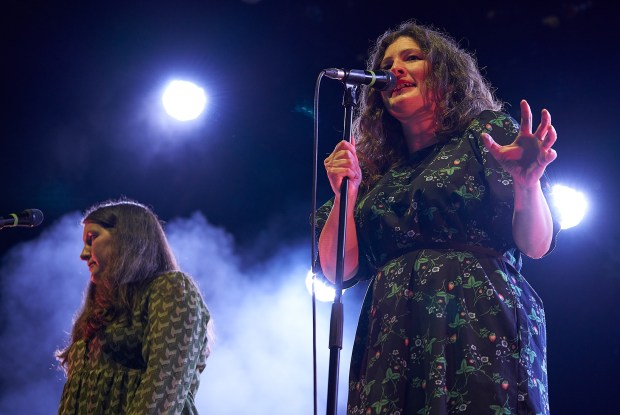The American Whine is one of the key vocal registers in rock and roll. You can trace that thin disaffected quaver through the decades from the Shangri-Las to Lou Reed, from Jonathan Richman to Neil Young. Inveigling, needy, smart-assed, it’s as vital a part of the DNA of the medium as a black leather jacket and a souped-up Chevrolet.
Ezra Furman, I’m pleased to report, is in possession of a vintage whine. Furman is a Jewish transgender woman who composes with compassion, wit, empathy and anger from those particular personal viewpoints. She wrote the soundtrack to Netflix blockbuster Sex Education and has just released an eloquent sixth solo album, All Of Us Flames.
In many respects she would no doubt consider herself an iconoclast, a necessary corrective to conventional mores. Musically, however, Furman is every inch a rock and roll classicist. The tension between these two positions lends her music a thrilling air of jeopardy, a sense of rules being acknowledged while simultaneously being broken. Performing with a four-piece band – two guitars, bass and keyboards; but of course – her set at the Edinburgh International Festival is essentially a breakneck tour through the pitstops of American street music, from girl-group sass to raucous garage-rock to heartland AOR.
‘I Wanna Be Your Girlfriend’ is woozy doo-wop. ‘Love You So Bad’ is punchy power-pop, somewhere between the Cars and the Replacements’ gonzo-rock. ‘I Saw The Truth Undressing’ is Prince’s ‘Purple Rain’ on three wheels and downers. ‘Forever in Sunset’ is as taut, melodic and gloriously cheesy as mid-1980s Springsteen. ‘Transition From Nowhere to Nowhere’ slips though the gears like the Pixies at their most puckish. ‘Train Comes Through’ is a slow-building Dylanesque parable which seems to announce the ascension of Furman’s writing to some new high place.
Each song feels like a bowing to tradition, even as the words tear tradition down. All the while, her voice oscillates wildly, from shaky falsetto to scratchy yelp to mid-register kiss-off. Furman is a compelling performer, droll between songs, utterly engaged during them. She ends with a heartfelt cover of Patti Smith’s ‘Because the Night’, a fitting finale for a fervent testimonial to the power of loud guitars, impassioned vocals and good old-fashioned rock and roll. It’s exciting and oddly touching to witness.
Playing EIF two nights later with her somewhat more restrained four-piece, Lucy Dacus also sings of God and fluid sexuality. The loping, blank-eyed ‘VBS’ is a funny-strange reminiscence of a summer bible school camp. Later, ‘Kissing Lessons’ is introduced as ‘a gay song’. Yet Dacus is more wistful and low-key than Furman: no whine here. Low and conversational, hers is the voice of the wise and slightly misfit friend. In a movie, she would play the long-suffering best buddy rather than the love interest. ‘You called me ‘cerebral’/ I didn’t know what you meant,’ she sings on ‘Brando’. ‘But now I do, would it have killed you to call me pretty instead?’
A contemporary – and occasional band-mate – of Phoebe Bridgers, Dacus ploughs a broadly similar field. Her songs are solid, sometimes pedestrian, mixing indie-rock, folk and a chillier electronic ambience. They are built to be efficient vehicles for her words, which possess the wry humour, wistful confusion, confessional quirks and sharply recalled sadnesses familiar to fans of films such as Booksmart and Licorice Pizza. Quiet songs, maybe, but with big feelings.
Dacus performs pretty much all of her most recent record, Home Video – beginning, boldly, with the eight-minute ‘Triple Dog Dare’. Her two older anthems – ‘I Don’t Want To Be Funny Anymore’ and ‘Night Shift’ – are sung back at her by a devoted crowd, yet they’re among a handful of songs which Dacus seems to be in the process of outgrowing. Coming-of-age tales of bad crushes, skipping school and conflicted basement memories feel callow in the presence of her stronger material.
The Mitski-ish Vocoder pop of ‘Partner in Crime’ doesn’t quite fly, but the best of this set, a good half-dozen songs, linger in the memory like finely crafted short stories. ‘Thumbs’ is a stand-out, stark and beautifully constructed. Sung with minimal backing it packs maximum emotional heft. ‘Please Stay’ comes a close second.
She throws in a cover of Cher’s ‘Believe’ by way of light relief and ends alone on the stage with an acoustic guitar, singing a new, as-yet-unreleased song which she begs us not to film or record. It’s quiet and beautiful and true. Dacus is good but you feel she might already be heading somewhere more interesting. Furman’s train, meanwhile, has arrived.
Got something to add? Join the discussion and comment below.
Get 10 issues for just $10
Subscribe to The Spectator Australia today for the next 10 magazine issues, plus full online access, for just $10.
You might disagree with half of it, but you’ll enjoy reading all of it. Try your first month for free, then just $2 a week for the remainder of your first year.













Comments
Don't miss out
Join the conversation with other Spectator Australia readers. Subscribe to leave a comment.
SUBSCRIBEAlready a subscriber? Log in